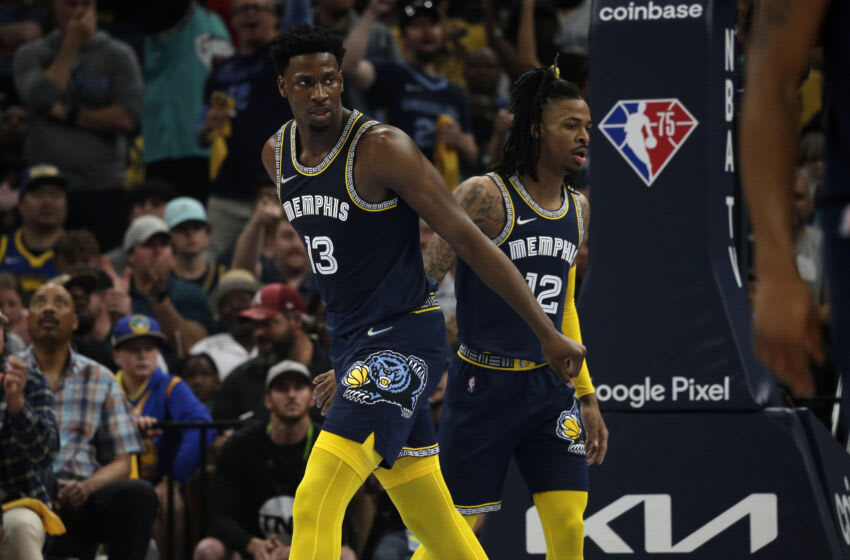
Memphis Grizzlies F Jaren Jackson Jr. and Memphis Grizzlies G Ja Morant (Petre Thomas-USA TODAY Sports)
The Memphis Grizzlies are in line for regression, and that’s okay
No team showed as much growth over the course of one season as the Memphis Grizzlies last year. Ascending from a frisky Play-In team to the second seed in the Western Conference, Memphis established its identity as the most disciplined group of trash-talkers basketball has to offer. Punishing their opponents for every weakness with speed and precision, the Grizzlies took on the persona of their leader, Ja Morant, as he snatched the Most Improved Player award and confirmed that he’s a superstar.
Boasting depth, versatility, and palpable chemistry, the Grizzlies deployed a rotation of a dozen players who would shift responsibilities through the ebbs and flows of the regular season. They took it to another gear in a hard-fought first-round series against the Minnesota Timberwolves before losing Morant to injury against the eventual champion Golden State Warriors.
The Memphis Grizzlies stuck to a handful of core principles: Dominate the glass, create fastbreaks through steals or blocks, push the tempo, generate looks for each other, and never be afraid to shoot your shot. They led the league in paint points, fastbreak points, and second-chance points, culminating in a fifth-place finish in overall net rating and the second seed in the West.
Although the players got ahead of themselves at times, Memphis’ 2021-22 season was a resounding success. Head coach Taylor Jenkins put on a masterclass, integrating veterans with a team driven by youth while positioning players to highlight each other’s strengths.
However, expectations are about to get ahead of the Grizzlies despite how incredible their season was.
The Memphis Grizzlies are in line for some regression.
There’s only one thing harder than becoming a successful team in the NBA, and that’s staying successful. Opponents grow healthier and address their weaknesses in the offseason while the next young team in line builds the confidence to overthrow whoever’s in their path. Recent history shows that younger teams that take off early tend to take a step back the following year (Atlanta Hawks and New York Knicks in 2021, Indiana Pacers in 2020, Portland Trail Blazers in 2019, etc.).
Now at a crossroads, the Memphis Grizzles front office appeared to accept this as another year of development for its young pieces. Although the team re-signed backup point guard Tyus Jones, a perennial candidate to lead the league in assist-to-turnover ratio, it lost some key pieces. They traded combo guard De’Anthony Melton–a knockdown shooter and defender—to the Philadelphia 76ers for the injured Danny Green’s expiring contract and first-rounder David Roddy. Crafty point-forward Kyle Anderson also left town to join the Minnesota Timberwolves in free agency.
Above all else, there’s a 6-foot-11, 3-point shooting elephant in the room that will have more of an impact than each of these losses combined. Big man Jaren Jackson Jr., a 22-year-old Defensive Player of the Year candidate, will miss the beginning of the season recovering from surgery for a stress fracture in his right foot. With a four-to-six-month timetable, he should return by the end of December, but he’ll probably have some rust to shake off upon return.
Unless a player stashed away on the bench like Xavier Tillman or Santi Aldama is prepared for a much bigger role, the team will suffer early in the season. Between Jackson Jr.’s injury, the departure of rotation pieces and their replacement by rookies, the Memphis Grizzlies may not jump out to the same record they did a year ago.
Sometimes, falling back to Earth is the best way to rebuild a path forward. For the Boston Celtics, a rising team that lost in the Eastern Conference three times in four years, taking a step back was the best way to reevaluate what works, retool the roster around its core pieces and gear up to try again. They’ve since gotten the monkey off their back and broke through to the NBA Finals, coming within two games of an 18th banner.
The team should have more financial flexibility and replenised assets to make changes after the 2022-23 season. For now, they can integrate young players into the system without thinking too much about their implications. With an exceptional nucleus of draft scouts, coaches, and players working in harmony, the future is bright in Memphis regardless of what comes next.
Plus, this team has defied odds in the past—it’s plausible they do it again sooner than we think.


